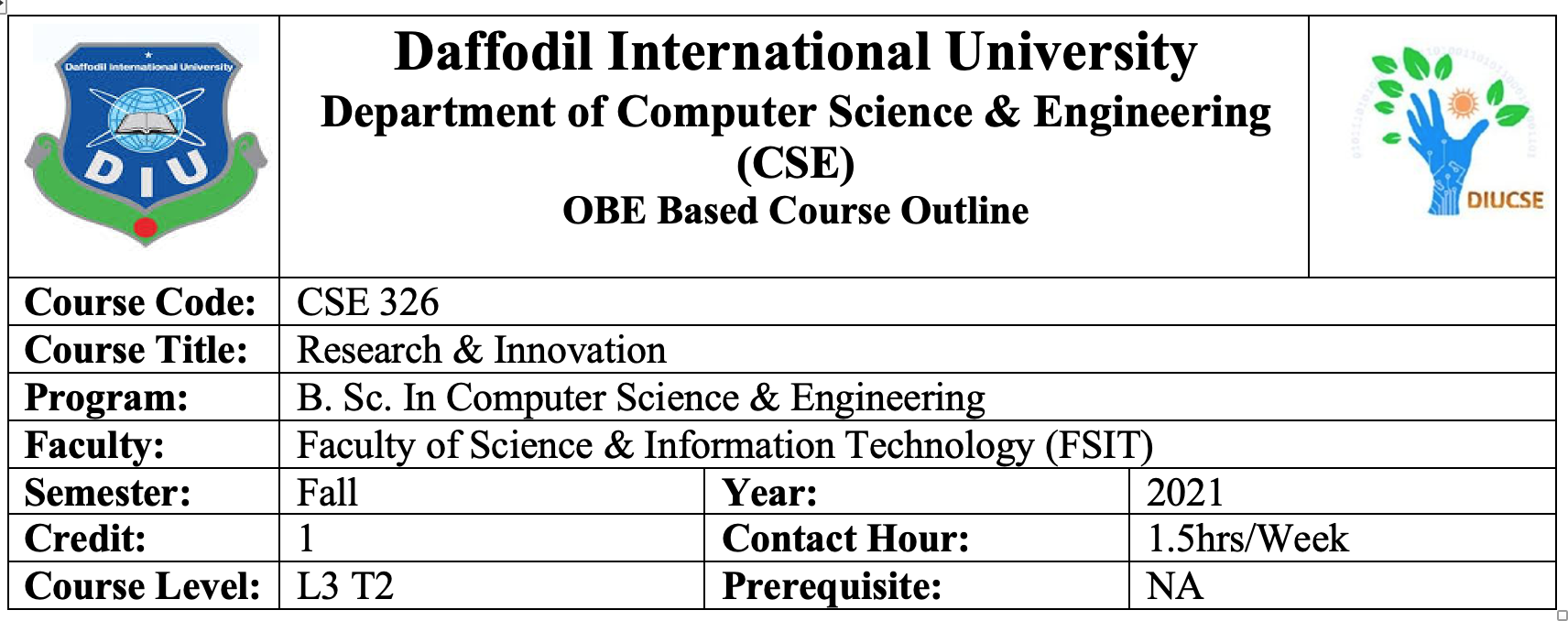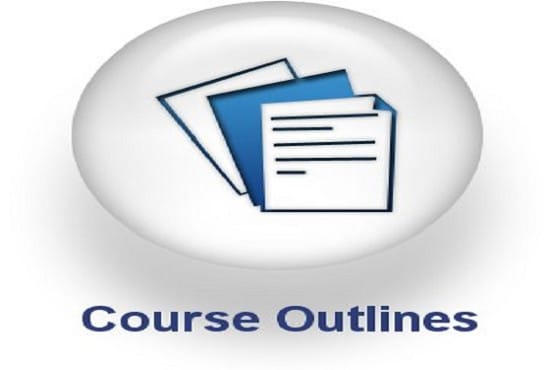Section outline
-
-
Course Rationale
Research and Innovation (RI) is the best way to establish a new understanding in any domain of knowledge. In the current era of dynamicity, new finding carries vital importance irrespective of the knowledge domain. Research is the key to create new ideas, technologies, methodologies that eventually resulted in innovation. The course focuses to formulate the pathway to walk in the area of research and innovation. The course starts the journey with the understanding basics of research, furthermore the process of conducting research to eventually innovate some useful ideas.
Course Objective
Upon successful completion of this course, students should be able to:
- Describe the fundamental aspects of formulating research questions.
- Explain the procedure of conducting a literature review to understand the importance of the research question.
- Design methodologies to answer the research question posed using appropriate tools and implementation.
- Explain analytical aspects of answering research question to formulate knowledge
- Describe the basics of innovation, the relationship with research and the way to have a fruitful innovation from detailed research.
- Maintain ethical aspects in formulating, designing and implementing research.
Course Outcomes (CO's)
CO1
To be able to apply analytical skills to map out the conceptual design for a real-life problem and formulate research questions to answer the real-life problems and innovate the solution.
CO2
To be able to conduct detailed study to have a fruitful innovative model for solving any research problem.
CO3
To be able to evaluate the logical problem to translate into a specific research problem and design model to have an innovative solution for the same.
CO4
To be able to build the knowledge outcome from findings using a framework of literature review and analytical model.
CO5
To be able to select appropriate approaches for the innovating solution of research problems through an exhaustive methodology.
Evaluation Criteria
- Attendance: 10%
- Presentation 1 : 15%
- Literature Review: 10%
- Presentation 2: 15%
- Final Paper: 30%
- Quiz : 20%
-
Recommended Books
- Louis Cohen, Lawrence Manion and Keith Morrison, Research Methods in Education, Sixth Edition
- Keith F Punch and Alis Oancea, Introduction to Research Methods in Education, Second Edition
- Donald Ary, Lucy Cheser Jacobs and Chris Sorensen, Introduction to Research in Education, Eighth Edition
- Henriikka Mustajoki and Arto Mustajoki, A New Approach to Research Ethics
- Paul Oliver, The student’s guide to research ethics
-
Topics of Discussion
- Introduction to Research
- Why Research is important?
- How to begin to work on research topics?
- Overview of Types of research works.
Expected Learning Outcome
- Appreciation of the needs of research
- Understanding the necessity of research
- Able to start research work
Learning Material
Introduction to Research Paper
-
Topics of Discussion
- Identification of research problem
- Formulating research questions
Expected Learning Outcome
- Understanding the necessity of research questions
- Testing the validity of the question in the context
- Setting the target research output
Learning Materials
Searching Papers for Literature Review
-
Topics of Discussion
- The existing knowledge around the research question
- Evaluation of the existing knowledge
- Literature review
Expected Learning Outcome
- Writing a concrete literature review around formulated questions
- Correlating the existing knowledge with research questions
- Identifying the research gaps to be bridged
Learning Material
Using Reference Manager (Mendeley) to Organize Literatures
-
Topics of Discussion
- Introduction on quantitative research design
- Types of variables in quantitative research design
- Measuring techniques
Expected Learning Outcome
- Understanding the diversity of variables in the quantitative approach
- Able to apply different tests to justify the hypothesis
- Understanding different measuring techniques of quantitative approach
Learning Materials
-
Topics of Discussion
- Introduction to qualitative research
- Diversity in research with qualitative research
Expected Learning Outcome
- Understanding the diversity of the qualitative approach
- Able to implement qualitative research approach
- Student Can give a group Presentation
- Each group should not be having more than 4 Students in any case
- Each Student in the Group Needs to Present at least 4 to 8 Papers of Respective Domain
- The Presentation needs to be in English
- The Camera should be Switched on While Presenting own Portion
- Single Presentation will be more Appreciated
- The Groupings and Research Topic should be Shared by 15th June 2021 in a consolidated Google Sheet
-
Assignment 1
- Submission of Literature Review
- Each Student Needs to Submit the Sole Assignment
- Each Student Needs to Review at Least 4-6 papers of Respective Domain
- The Review should not be less than 500 Words
- The File should be in doc/docx format
- The File should be named 'YourSection_YourId'.
-
Assignment 1
- Submission of Literature Review
- Each Student Needs to Submit the Sole Assignment
- Each Student Needs to Review at Least 4-6 papers of Respective Domain
- The Review should not be less than 500 Words
- The File should be in doc/docx format
- The File should be named 'YourSection_YourId'.
-
Assignment 1
- Submission of Literature Review
- Each Student Needs to Submit the Sole Assignment
- Each Student Needs to Review at Least 4-6 papers of Respective Domain
- The Review should not be less than 500 Words
- The File should be in doc/docx format
- The File should be named 'YourSection_YourId'.
-
Topics of Discussion
- Sampling, Methods, Framework
- Conceptualize research problems into implementation
- Linking data with proposed concepts
Expected Learning Outcome
- Able to conceptualize the framework/s needed for the research
- Combining both quantitative and qualitative approaches
- Understanding the implementation procedures
Learning Material
-
Topics of Discussion
- Ethical procedures & principles in research
- Challenges of ethical research in education
- Ethics of student research
Expected Learning Outcome
- Able to identify unethical practices of educational research
- Understanding the role of students in maintaining research ethics
Learning Material
-
Topics of Discussion
- Introduction to innovation
- Diversity & frameworks of innovation
Expected Learning Outcome
- Understanding innovation & its importance
- Able to identify different configurations of innovation
Discussion Slides
-
Topics of Discussion
- Strategy design: questionnaire, interview and observation
- Ethical aspects of these strategies
- Diverse types of approaches in these strategies
Expected Learning Outcome
- Understanding different strategies for data collection in research
- Able to design multiple strategies to collect useful data
-
Topics of Discussion
- Surveys, longitudinal, cross-sectional and trend studies
- Designing and planning of these types
Expected Learning Outcome
- Understanding diverse types of approaches in educational research
- Able to conduct and design research in different approach
-
Topics of Discussion
- Writing techniques and choices
- Communicating through writing
Expected Learning Outcome
- Able to prepare a research paper with proper conceptualization
- Expressing ideas with proper explanations
Learning Materials
Refining or Finding Publication Venues and Articles from Any Journal
-
Topics of Discussion
- Linking or conceptualizing research into innovation
- Importance of proper presentation in papers
- Innovation models in research
Expected Learning Outcome
- Understanding the importance of converting research into an innovative model
- Able to represent the idea properly in the communication
-
-
Assignment 2
- Submission of Final Draft
- This will be a group assignment.
- Each group needs to submit a paper/survey paper on the domain they chose earlier
- The Paper should not be less than 2500 Words
- Each group will submit the paper in two different citation formats (APA & IEEE).
- The Paper will be the same, only the citation style will be different in two drafts.
- Refer to the video uploaded on Mendeley to change the citation style easily.
- In online text, you have to write your member's student Id along with the group name.
- The File should be in doc/docx format
- The File should be named 'YourSection_YourGroupName_CitationStyle'.
-
Assignment 2
- Submission of Final Draft
- This will be a group assignment.
- Each group needs to submit a paper/survey paper on the domain they chose earlier
- The Paper should not be less than 2500 Words
- Each group will submit the paper in two different citation formats (APA & IEEE).
- The Paper will be the same, only the citation style will be different in two drafts.
- Refer to the video uploaded on Mendeley to change the citation style easily.
- In online text, you have to write your member's student Id along with the group name.
- The File should be in doc/docx format
- The File should be named 'YourSection_YourGroupName_CitationStyle'.
-
Assignment 2
- Submission of Final Draft
- This will be a group assignment.
- Each group needs to submit a paper/survey paper on the domain they chose earlier
- The Paper should not be less than 2500 Words
- Each group will submit the paper in two different citation formats (APA & IEEE).
- The Paper will be the same, only the citation style will be different in two drafts.
- Refer to the video uploaded on Mendeley to change the citation style easily.
- In online text, you have to write your member's student Id along with the group name.
- The File should be in doc/docx format
- The File should be named 'YourSection_YourGroupName_CitationStyle'.
-



